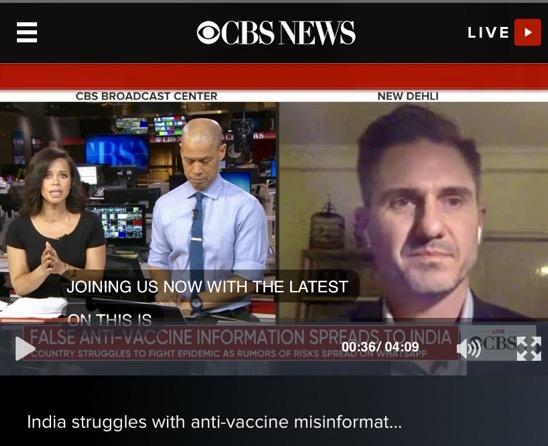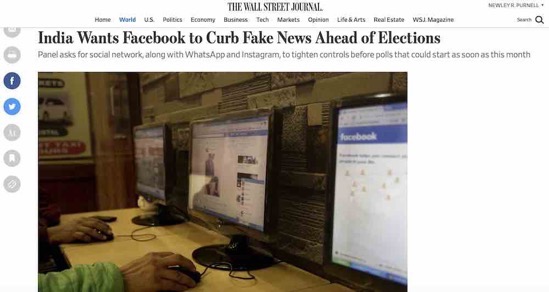
I joined CBS News’s Anne-Marie Green and Vladimir Duthiers on Monday to discuss my recent story about antivaccine misinformation on WhatsApp here in India.
The clip is online here.

I joined CBS News’s Anne-Marie Green and Vladimir Duthiers on Monday to discuss my recent story about antivaccine misinformation on WhatsApp here in India.
The clip is online here.

That’s the headline of my most recent story, which I wrote with my colleague Rajesh Roy. It begins:
NEW DELHI—India is pushing Facebook Inc. to do more to combat fake news ahead of coming national elections, underscoring global scrutiny on the social-media titan.
A closed Indian parliamentary panel on Wednesday asked Joel Kaplan, the company’s global policy chief, to ensure the social network, its WhatsApp messaging service and its photo-sharing app Instagram wouldn’t be abused as the world’s biggest democracy goes to the polls. India’s election commission is expected to announce soon that the elections will begin in March or April.
“We discussed the challenges faced with these platforms, especially with regard to data security and citizens’ privacy,” Anurag Thakur, a parliamentarian from the ruling Bharatiya Janata Party who heads the panel on information technology, told The Wall Street Journal.

I’m not sure where I found it, but I came across this excellent column from November by Leonard Pitts, Jr. It begins:
There is good news on fake news.
As you doubtless know, the proliferation thereof has people fretting. President Obama has dubbed it a threat to democracy. And there is a rising demand for social-media outlets like Facebook and Twitter, often used as platforms for these viral untruths, to take corrective action.
But the good news is that anyone who wishes to avoid fake news can do so easily. There is, in fact, a news platform that specializes in gathering and disseminating non-fake news. So committed are its people to this mission that some have been known to risk, and even to lose, their lives in the process.
Granted, this platform is imperfect — sometimes it is guilty of error or even bias. But hardly ever will you find it trafficking in intentional falsehoods.
So what, you ask, is this miracle medium? Well, it’s called a “newspaper” Maybe you’ve heard of it.
Ahem.
Yes, there is a point here, and it is this: The facts are knowable — and easily so. So the proliferation of fake news should tell you something.
Yes, newspaper reporters make mistakes. Yes, editors make mistakes. Yes, newspapers suffer from organizational failings. And yes, newspapers must continue to become not merely papers, but digital news organizations, in order to best serve their audiences.
But Pitts’s point — that newspapers by their very nature are designed to surface truths, unlike so many other kinds of media outlets — is a crucial one indeed in today’s low-signal, high-noise environment.
Hate fake news? Consider subscribing to a newspaper, if you haven’t already.